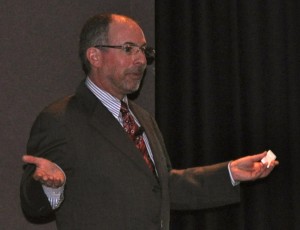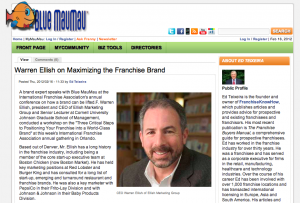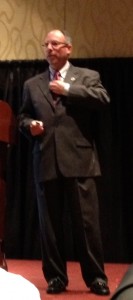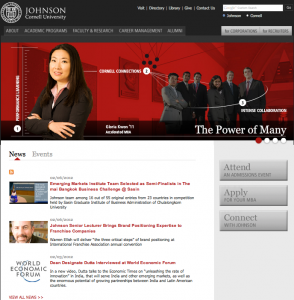Call 303-808-4680
Posts tagged Cornell University Johnson School
Your Restaruant As a Brand: Interview on Branding and Brand Positioning with Warren Ellish on Foodservice Radio, the new streaming 24-hour internet radio station programmed for restaurant and food service operators launched at the National Restaurant Show.

Creating a brand around your restaurant has many benefits. A clear, concise brand statement can drive marketing, development and even operational activities. In a Foodservice Radio interview, Warren Ellish, Senior Lecturer at Cornell University and CEO of Ellish Marketing Group talks about how you can turn your restaurant – large or small – into a world class brand.
To listen to the complete interview visit Food Service Radio or at iTunes.
Excerpts from the interview:
There are many misconceptions about branding among food service operators. “Most people think of a brand as mark,” says Ellish. “It is not a mark, a brand leaves a mark. What is really interesting is that restaurant customers don’t really care about a brand name, logo or tag line. What they really care about is who your brand is, what it stands for, what your brand offers, and very importantly, why your brand is different.”
“Brand positioning is the way anyone wants the consumer to think about their product or service relative to competing brands,” Ellish adds. “It is the most basic of all strategic statements. It provide the blueprint for all the marketing and development of any brand and it focuses the efforts of all those involved in brand activities. It states the reason for a brand’s existence.”
There are “three questions that will help people easily determine if their brand is strategically positioned and if their message is being clearly communicated,” says Ellish. “They are ‘What business is your brand in; what is the target market for your brand; and what is the point of difference for your brand?’”
Ellish suggests putting the answers to those questions together into a simple brand positioning statement, “To (your market target), (your brand) is the brand of (your competitive set) that offers (your point of difference).”
This exercise often points out the weaknesses in the current brand positioning. “What’s really interesting is when I do this exercise, whether it is with a small entrepreneurial group or a very large corporate environment, you find significant inconsistencies in the answers. Most members of the team list points of similarity and not points of difference,” says Ellish. “Make sure your reason for being is exclusive and unique, and make sure using your brand becomes a true experience for your guests.”
Defining your brand positioning also helps with social media. It helps your customers remember exactly what you want them to know about your brand. Those customers will in turn communicate that message to others.
When it comes to branding, “The little guy has as much opportunity as the big guy,” Ellish concludes. “All they have to do is make sure they go through and position their brand and make sure that have a preemptive, ownable and defendable point of difference. If they don’t, then there is no reason for anyone to become a loyal follower and an advocate of their brand.”
For more information or to contact Mr. Ellish, visit www.ellishmarketing.com or call 303-762-0360.
Don’t Let A Point Of Similarity Become Your Point Of Difference
Successfully identifying and securing a powerful brand positioning is of critical importance to every brand. It is helpful to anyone who wants to influence other people. Whether you are promoting a product, a service, a cause, a candidate, an organization, an institution or even yourself and your own career. Positioning will aid in getting your desired message across to the people you want to reach and make an impression that lasts.
One of the critical steps in developing a powerful brand positioning is to identify your brands point of difference – – the specific consumer benefit which you want consumers to associate most readily with your product or service. What does your brand do that no one else’s brand does as well and that your target cares about?
When defining your brands point of difference, don’t let a point of similarity become your point of difference. So often I see this.
When speaking recently to industry audiences on branding and brand positioning (National Restaurant Association Show, International Franchise Association National Convention and Entrepreneurs’ Organization Global Leadership Conference) or to the executive teams of clients, I ask three short questions: How many of your grew up wanting to be average? Or just like everyone else? Or of good quality? Rarely do I see any hands or much of a positive response. However, many brand leaders are perfectly OK about making their brands just like this – – average, just like everyone else and good.
Many of the items that are an integral part of your product/service but are not preemptive, ownable and defendable become points of entry into your competitive set and are nothing more than points of similarity. Yes, they are all important to your product or service and in many cases you must deliver on these flawlessly just to be in business. But this is not what sets you apart, not a reason a customer should or will choose to use your brand over competitor brands, and most definitely this is not a reason for them to ever become a brand advocate.
For more information on how to quickly and affordably position and brand your business to succeed in today’s competitive marketplace, visit www.ellishmarketing.com, or reach Warren directly at 303-762-0360 or moc.gnitekramhsillenull@hsille.nerraw.
Cornell Johnson Senior Lecturer Provides Branding Expertise to Attendees of Annual National Restaurant Association Show
 Warren Ellish explores “the three critical steps” of brand positioning with restaurant industry conference attendees today, at the 2012 National Restaurant Association (NRA) Show. Cornell University’s Johnson Senior Lecturer of Marketing, Warren Ellish, President and CEO of the Ellish Marketing Group, presented a 90-minute session on brand positioning to restaurateurs, entrepreneurs, franchisees, and culinary professionals, among other restaurant industry conference attendees.
Warren Ellish explores “the three critical steps” of brand positioning with restaurant industry conference attendees today, at the 2012 National Restaurant Association (NRA) Show. Cornell University’s Johnson Senior Lecturer of Marketing, Warren Ellish, President and CEO of the Ellish Marketing Group, presented a 90-minute session on brand positioning to restaurateurs, entrepreneurs, franchisees, and culinary professionals, among other restaurant industry conference attendees.
An expert on brand positioning, Ellish, ‘77, MBA ‘78, has more than 30 years of client and consulting experience. His his talk, “Three Steps to Positioning Your Restaurant into a World-Class Brand,” detailed the importance of positioning a brand through “points of difference” and aligning all other brand aspects behind its positioning.
As the National Restaurant Association forecasts a record-high $600 billion in sales for 2012, restaurants are increasingly seeking to leverage increased growth and augment their brands.
During his sold-out presentation, Ellish explained the elements of a positioning statement—a brief description of what a business does and how it does it differently and better than its competitors. He encouraged audience members to apply this to their own restaurants or businesses and to reflect on what their unique differentiators may be.
Part of Ellish’s educational session also included a simple test to help participants determine if their brands are strategically positioned and how they can analyze the results to strengthen their brands.
“Without a concise brand positioning statement with a competitive ‘point of difference’ and complete management alignment behind that positioning, it will be difficult to communicate a clear and meaningful message about your brand,” Ellish noted in a branding document provided to session attendees.

Illuminating key brand positioning opportunities for attendees, Ellish drew on his own restaurant and packaged goods marketing experience. Ellish was a founding partner and VP of Marketing for Boston Chicken, where he was a member of the core start-up executive team and led the brand through its conversion to Boston Market.
Ellish brings his experience to the MBA classroom at S.C. Johnson Graduate School of Management at Cornell University, teaching in the Strategic Marketing Immersion program and product management class. He founded and hosts the Marketing Executive One-On-One Coaching Program, now in its fifth year. At this annual event, top-level marketing executives spend two days at Johnson, meeting with and coaching MBA students preparing for careers in marketing.
Warren Ellish Delivers Keynote Address to Open 13th Annual Ben E. Keith Market Place Food Show
 The 2012 Ben E. Keith Market Place Food Show drew the largest crowd for a keynote address in the company’s history. Keynote speaker, Warren Ellish, provided the attending restaurant and hotel operators with new tools to have an immediate impact on building their local businesses into world class brands.
The 2012 Ben E. Keith Market Place Food Show drew the largest crowd for a keynote address in the company’s history. Keynote speaker, Warren Ellish, provided the attending restaurant and hotel operators with new tools to have an immediate impact on building their local businesses into world class brands.
Garcia’s Kitchen, a Albuquerque tradition since 1975 with seven area locations, was the winner of the keynote door prize. The Garcia family and members of the management team received an afternoon of branding and marketing consulting with the keynote speaker, Warren Ellish, President and CEO of Ellish Marketing Group and Senior Lecturer at Cornell University’s Samuel Curtis Johnson Graduate School of Management.
 The 2012 New Mexico ProStart competition, in conjunction with the New Mexico Restaurant Association, also took place at the Market Place Food show. The competition attracts top high school students from around New Mexico who are enrolled in the ProStart Program at their schools. These students have proven their skill and commitment to the hospitality industry through vigorous coursework and on-the-job training. First place teams move on to compete at the National ProStart Invitational. The teams did a great job showcasing their talents.
The 2012 New Mexico ProStart competition, in conjunction with the New Mexico Restaurant Association, also took place at the Market Place Food show. The competition attracts top high school students from around New Mexico who are enrolled in the ProStart Program at their schools. These students have proven their skill and commitment to the hospitality industry through vigorous coursework and on-the-job training. First place teams move on to compete at the National ProStart Invitational. The teams did a great job showcasing their talents.
Warren Ellish on Maximizing the Franchise Brand

Featured interview today in Blue MauMau by Ed Teixeira the founder and owner ofFranchiseKnowHow.
A brand expert speaks with Blue MauMau at the International Franchise Association’s annual conference on how a brand can be lifted. F. Warren Ellish, president and CEO ofEllish Marketing Group and Senior Lecturer at Cornell University Johnson Graduate School of Management, conducted a workshop on the “Three Critical Steps to Positioning Your Franchise into a World-Class Brand” at this week’s International Franchise Association annual gathering in Orlando.
Based out of Denver, Mr. Ellish has a long history in the franchise industry, including being a member of the core start-up executive team at Boston Chicken (now Boston Market). He has held key marketing positions at Red Lobster and Burger King and has consulted for a long list of start-up, emerging and turnaround restaurant and franchise brands. He was also a key marketer with PepsiCo in their Frito-Lay Division and with Johnson & Johnson in their Baby Products Division.
BMM: How can franchisors and franchisees maximize their brand image?
Summary: Franchisors need to work hand in hand with their franchisee advisory boards in developing a clearly defined brand positioning statement for their brand.
Ellish: When I consult with franchisors, I want to engage the entire executive team and the franchisee advisory board members in everything we do from a brand strategy standpoint. And this starts with developing the brand’s positioning statement. It’s important for the group to co-write brand positioning and then endorse the strategy and programs that are the end result of that brand positioning. If only one group is involved in the process, the potential to fully maximize the franchise brand’s potential in the marketplace is minimized. Since the franchisees are closest to the customers, they need to be a part of the brand positioning process. Franchisor CEO’s that I have worked with who have utilized this approach have seen it work very successfully. For it to work, the franchisee advisory board members must pledge their support to endorse and move forward with the work that the group jointly develops and agrees to, even if as individuals they are not in total agreement. Complete franchisor and franchisee alignment is key to successfully implementing marketing strategy and programs.
BMM: Is there a particular process you follow when working to maximize a franchise brand’s potential?
Summary: When it comes to the franchise brand, every member of the organization on both the franchisor and franchisee side has to deliver the same message.
Ellish: It’s important that each company develop and then deliver a clearly defined brand positioning statement with complete management alignment behind that positioning. I like to ask three short and simple questions before starting the brand positioning process with a franchise organization to help determine if their franchise brand is strategically positioned and if its message is being clearly communicated. I ask each member of the senior management franchisor team and the participating franchise advisory board the following three questions.
- What business are you in?
- What is the target market for your brand, or said differently, what is the audience or group you are trying to persuade to use your product or service?
- What is the point of difference for your brand? List no more than three differences.
An important aspect of number three is to establish what sets the brand apart from others in the frame of reference or business that they are in. This involves establishing a point of difference that is:
- Pre-emptive
- Ownable
- Defendable
A franchise brand wants to make sure its points of difference are not points of similarity to the competition or simply points of entry in a business, which I so often see.
BMM: What do you learn when you ask these questions?
Summary: I typically see significant inconsistencies in the answers to most if not all of the three questions as well as points of difference that are nothing more than points of similarity to everyone else that they are competing with.
Ellish: This is not an unusual result for most companies. If the core management team and the franchise advisory board members have such differences in their answers to these core brand questions, can you imagine how difficult it will be to communicate a clear and meaningful message about your brand to your employees and in turn to your customers? As the message moves through the organization, so much gets lost in the translation. It is important that everyone in a franchise organization fully understands and recites the same message.
BMM: Quite often the subject of social media comes up as a possible point of conflict between franchisors and their franchisees. Any advice on this subject?
Summary: The franchisor needs to establish their social media policy rather than wait for a problem to arise.
Ellish: First of all, franchisors have to define the social media strategy for their brand. Within this overall strategy, the role of the franchisor and the franchisee, pertaining to social media, needs to be communicated up front. Some franchisors wait too long to take control of social media, so the franchisees take the lead and you end up with a non-cohesive social media effort. Only after a problem arises do some franchisors jump in. It’s important for the franchisor to remain in control of the brand website and all other social portals such as the Facebook page. In addition, it would be wise for franchisors to provide their franchisees some training in this area. Without this direction, franchisees can’t be expected to understand what they can and can’t do and what the responsibility of the franchisor is.
BMM: What about franchisees who want to personalize the franchise website?
Summary: Franchisors need to control on-line and social media communication in order to send a consistent message for the brand.
Ellish: It is very important that a brand maintains a consistent message in all public places. This includes the brand’s website and social media pages such as Facebook. A good way to do this is to create a location-specific webpage that is built from a brand template but that has unique information for each specific location. This page can be accessed via a location subpage of the brand’s overall site and can also be used for local search with sites like Google Places and Google Maps for localized GPS enabled searches. I suggest using a controlled set of photos and descriptive copy, but each location specific page can have underlying unique local descriptors (which are picked up in search) for each photo. All of this will allow for local uniqueness without losing brand control. This process can be done in batch processing and there are some great franchise service providers who can help with this.
BMM: Once the branding strategy is implemented, what can the franchisor do to achieve success?
Summary: Franchise organizations need alignment not only between franchisor and franchisee, but also between marketing and operations.
Ellish: Successful marketing is the result of close cooperation between the marketing and the operations teams. The marketing team is responsible for the first 50% of the process with the operations team responsible for the second 50%. Let me explain. The marketing team develops and implements messaging and programs to generate awareness and trial for the brand based on leveraging the brand’s point of difference. The object, of course, is to reach a specific audience, driving potential customers to visit or use the brand’s product or service. It is then operation’s job to deliver a flawless experience, consistent with the brand promise, to the customer. When marketing and operations work together in this way, the result will be repeat customers, positive word-of-mouth recommendations and business success.
Check out the complete interview at http://www.bluemaumau.org/11282/warren_ellish_maximizing_franchise_brand
Branding and Brand Positioning Expert Addresses 52nd Annual International Franchise Association Convention
 F. Warren Ellish, President and CEO of Ellish Marketing Group and Senior Lecturer at Cornell University’s Samuel Curtis Johnson Graduate School of Management today addressed the leaders of the world’s most important franchisors, franchisees and suppliers to the franchise community. Ellish, a popular marketing speaker as well as a respected franchise and restaurant marketing consultant, spoke to a standing-room-only crowd at his session on brand positioning and “The Three Critical Steps to Positioning Your Franchise Into a World-Class Brand.” The thought provoking and entertaining 90-minute session provided the franchise leaders with specific tools to help them build better local businesses one opportunity at a time as well as help them build better brands. These tools will have an immediate impact on their businesses and their personal careers.
F. Warren Ellish, President and CEO of Ellish Marketing Group and Senior Lecturer at Cornell University’s Samuel Curtis Johnson Graduate School of Management today addressed the leaders of the world’s most important franchisors, franchisees and suppliers to the franchise community. Ellish, a popular marketing speaker as well as a respected franchise and restaurant marketing consultant, spoke to a standing-room-only crowd at his session on brand positioning and “The Three Critical Steps to Positioning Your Franchise Into a World-Class Brand.” The thought provoking and entertaining 90-minute session provided the franchise leaders with specific tools to help them build better local businesses one opportunity at a time as well as help them build better brands. These tools will have an immediate impact on their businesses and their personal careers.
Cornell Johnson School Senior Lecturer Brings Brand Positioning Expertise to Franchise Companies
 Warren Ellish will deliver “the three critical steps” of brand positioning at International Franchise Association annual convention
Warren Ellish will deliver “the three critical steps” of brand positioning at International Franchise Association annual convention
Johnson visiting senior lecturer of Marketing, Warren Ellish, President and CEO of theEllish Marketing Group, on February 13 will deliver a 90-minute session on brand positioning at the annual convention of the International Franchise Association (IFA) in Orlando, Florida. The IFA is the world’s oldest and largest organization representing franchising worldwide. Its mission is to protect, enhance and promote franchising through government relations, public relations and educational programs.
Ellish, ’77 , MBA ’78, is a senior marketing executive, with more than 30 years of client and consulting experience. He is an expert on brand positioning, and shares his wealth of ideas in his IFA talk, titled “Three Critical Steps to Positioning Your Franchise into a World-Class Brand.” In his presentation, Ellish offers franchising executives a quick and easy test to see if their brands are strategically positioned and communicating their messages clearly; the key elements of a positioning statement; statement template to capture a brand’s positioning and a dozen case studies.
Ellish brings his experience to the MBA classroom at Johnson, teaching in the Strategic Marketing Immersion program and product management class. He founded and hosts the Marketing Executive One-on-One Coaching Program, now in its fifth year. At this annual event, top-level marketing executives spend two days at Johnson, meeting with and coaching MBA students preparing for careers in marketing.
Check out the link at: http://www.johnson.cornell.edu/About/News-Publications/Article-Detail/ArticleId/948/Johnson-Senior-Lecturer-Brings-Brand-Positioning-Expertise-to-Franchise-Companies.aspx

 Attendees at the 2012 National Restaurant Show in Chicago will have the opportunity to hear Warren Ellish, President and CEO of Ellish Marketing Group and Senior Lecturer at Cornell University’s Samuel Curtis Johnson Graduate School of Management present “
Attendees at the 2012 National Restaurant Show in Chicago will have the opportunity to hear Warren Ellish, President and CEO of Ellish Marketing Group and Senior Lecturer at Cornell University’s Samuel Curtis Johnson Graduate School of Management present “